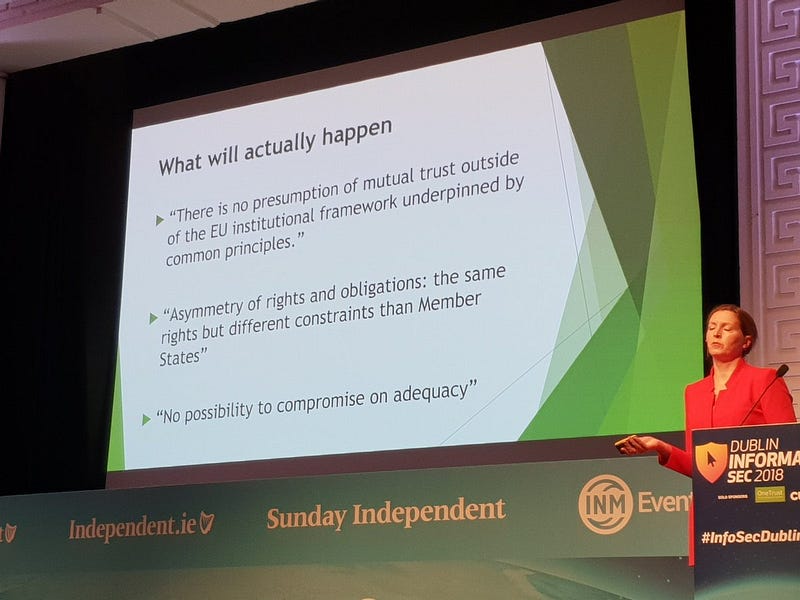Towards a Hard Data Border in the UK

Towards a Hard Data Border in the UK?
If you come away from a conference, and it has made you think deeper about things, then that has been a good conference. And so today I attended Dublin Information Security 2018, and I just loved hearing from so many different viewpoints.
My main input was a presentation on the Dark Web and on the perfect crimes for Cyber criminals:

But the most interesting (for me) and the most shocking presentation was the one that related to the UK’s place in a post-Brexit world. And so, if I wasn’t already depressed about what Brexit is doing to the economy in the UK, I was even more depressed after a talk by Maria Farrell. She said more in her 30 minute talk about the likely outcomes for a post Brexit data sharing agreement than I have seen in any debate in the UK. It was one of the best conference presentations I have seen in a long time:

For all the positive things that our politicians have been saying that the UK will just continue on with friction-less borders for data, it is all likely to be WRONG! A good deal of this narrative has been around “adequacy++”, and where the UK will be seen as adequate in terms of GDPR, as it has all the right processes in place. But, Maria blew this out of the water:

And the reason that there is likely be a hard border for data is because of the Snowden revelations, and where UK agencies were exposed in being part of a spying network against its citizens:

Along with this, the mass harvesting of citizen data is not compatible with GDPR, and it likely to result in the UK not being trusted as a place for EU data. Companies looking to based themselves in the UK are thus likely to look elsewhere, as there may be problems with providing the right safeguards for EU-related data.
The UK will thus have to provide that it uses the principles of “necessity and proportionality” with the intelligence agencies:

But this, as Maria outlines, will take time to build up trust, and is not just going to happen instantly. The UK is thus likely to drift for a while with a hard data border, while it builds up the trust with the EU. If you are in the club, it is much easier to do this, but outside it will be extremely difficult:

You get the feeling that the UK has been “tricked” into Brexit by so many promises, and that just aren’t achievable. I believe we, as a nation, have no rights to take away economic stability and the fundamental rights of our next generation, for nothing in return. I see no meaningful debates in the UK about GDPR and Brexit, and in the damage that it will do to our economy. The marketplace of the future is data, and the UK is putting at risk its whole infrastructure, with so little in return.